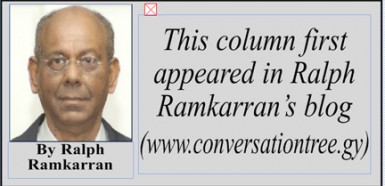Accusations of racial discrimination in Guyana’s politics by Guyanese politicians are nothing new. Between 1957 and 1964 the PPP governments endured charges of ‘apaan jaat,’ adapted to mean ‘support your own kind.’ During 1964 to 1992 the PNC governments were consistently accused of racial and political discrimination. Between 1992 and 2015 PPP governments were targeted by the opposition for “ethnic cleansing” and ethnic discrimination. No one should therefore be surprised at accusations by Leader of the Opposition, Mr Bharrat Jagdeo and the PPP that racial discrimination is taking place in Guyana.
 The realities of Guyana have caused our main political parties to take cognizance of the fact that organized political expression and activity are driven by ethnic insecurities. Both Indians and Africans feel more secure in supporting parties that they believe represent and protect their ethnic interests. In order to sustain that support, each of our main parties must appear to represent, or purport to represent, the interests of the ethnic group which supports it. This is one of the factors that explains the accusations of discrimination by the party out of office against the party in office and their appeals, subtle or open, to ethnic constituencies.
The realities of Guyana have caused our main political parties to take cognizance of the fact that organized political expression and activity are driven by ethnic insecurities. Both Indians and Africans feel more secure in supporting parties that they believe represent and protect their ethnic interests. In order to sustain that support, each of our main parties must appear to represent, or purport to represent, the interests of the ethnic group which supports it. This is one of the factors that explains the accusations of discrimination by the party out of office against the party in office and their appeals, subtle or open, to ethnic constituencies.
The facts surrounding the distribution of jobs, appointments, goods and services, which may or may not result in some ethnic imbalances, are far more complex than mere discrimination. The PPP should know that better than anyone else. It rejects allegations that it practised discrimination while in government. Yet dozens of boards appointed by the PPP were dominated by Indians and the predominance of Indians appointed to some government posts was noticeable. All ambassadors were Indian on the ground that no Africans were qualified, according to Dr Luncheon.
During the era of PNC rule between 1964 and 1992, the PPP devised a demand in relation to the issue of race. It campaigned against ‘racial and political discrimination’ and advocated that only a ‘political solution’ will resolve our ethno/political problems. The PPP proposed the National Patriotic Front (NPF) and a government based on the NPF, as a concrete project to give effect to ‘winner does not take all.’ This would have seen an executive presidency held by the PNC, and a prime ministership, with more powers than are provided for in this constitution, held by the PPP. ‘Winner does not take all,’ rejected by the PNC, was never taken off the table but it did not survive the PPP’s electoral victory in 1992.
Our disputes about race and ethnicity took a turn for the worse after 1992. The language became sharper and more divisive. The PNC, particularly Mr Desmond Hoyte, repeatedly and over a number of years, accused the PPP/C government of “ethnic cleansing.” This phrase came into popular use in the Bosnian civil war to describe the wholesale slaughter of Bosnian Muslims. Notwithstanding criticisms of Mr Hoyte’s use of the phrase because of its horrific implications, which had no relation to Guyana, he continued it for several years.
Street violence, particularly in Georgetown, after the elections 1992, 1997 and 2001 intensified ethnic fears across the country. During the disturbances after the 1997 elections, Mr Hoyte horrified many by calling upon the security forces to extend ethnic solidarity with their “kith and kin” in the PNC. These developments heightened ethnic cleavages.
The two main political parties had always maintained a posture of being multi-ethnic and of representing both major races in Guyana. But from 2006, particularly in the National Assembly, the PNCR began to explicitly say that it was speaking on behalf of its supporters’ interests. Now that the PPP is in opposition, they have adopted the same posture as evidenced by Mr Jagdeo’s speech.
Speaking on behalf of Indians in New York recently, and to an Indian audience, Mr Jagdeo revealed the new PPP agenda. He said “we gonna take back Guyana.” That must mean that “we” own Guyana, that it was taken away from “us” and that “we” must now take it back. He did not say from whom “we” will take back Guyana, whether it is from the PNC, or from Africans. He clearly meant, even if he did not say it, that “we” will then rule Guyana in “our” interests because it belongs to “us.” The big question is, who are “we?”
In full hyperbolic flow, Mr Jagdeo answers the question himself. He said: “There is an assault on people of Indian origin. There is an assault on supporters of the PPP. What we thought would never return to Guyana in one short year, has returned with full force and even worse in some regards than the Burnham era.” He promised to “defend our people in these dark times.”
Faced with a torrent of criticism, he trotted out some loyalists, Clement Rohee, Gail Teixeira and Anil Nandlall, as he usually does when under pressure, to prove discrimination. But charges of discrimination which Mr Jagdeo and the PPP have made before are not new. What is new are his emotive appeals to “defend” Indians “in these dark times” and his promise to Indians to “take back Guyana” for them. This is a wholly new dimension to the PPP’s agenda, namely, its formal and official transformation by Mr Jagdeo into an ethnic party representing exclusively ethnic interests. Cheddi Jagan must be turning in his grave!





